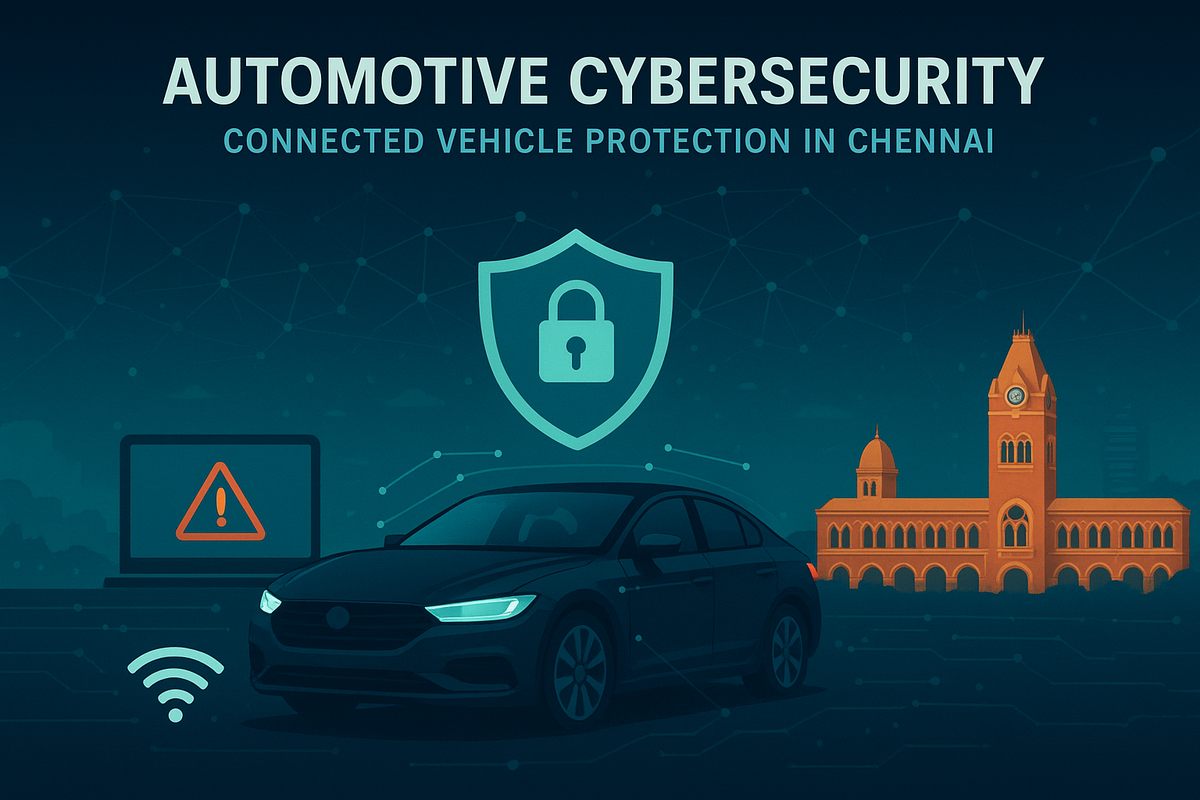Automotive Cybersecurity: Connected Vehicle Protection in Chennai

Introduction: The Era of Connected Mobility
Modern vehicles are evolving into complex, internet-connected systems capable of advanced navigation, diagnostics, infotainment, and even autonomous driving. This transformation brings unprecedented convenience—but also exposes automobiles to a surge in cybersecurity risks that must be addressed to ensure public safety and trust.
Why Connected Vehicle Security Matters
As Chennai’s automotive sector rapidly digitizes, vehicles increasingly rely on software, sensors, cellular IoT, and over-the-air updates, making them attractive targets for hackers. The consequences of cyberattacks in transportation can be severe:
- Hijacking vehicle controls (braking, steering, acceleration)
- Tampering with in-vehicle networks (CAN, Bluetooth, RF, Ethernet)
- GPS and telematics signal spoofing
- Data theft or privacy leaks (driver profiles, tracking, infotainment)
- Coordinated attacks on public transport or fleets, impacting city infrastructure
Anatomy of Automotive Cyber Threats
Threat Vectors in Connected Cars
Connected vehicles in Chennai face multi-channel threats, including:
- Cellular and WiFi communications
- Over-the-air software updates
- Infotainment and app connections (CarPlay, Android Auto)
- Vehicle-to-Vehicle (V2V) and Vehicle-to-Infrastructure (V2I) links
- OBD-II and USB ports
Real-World Attack Scenarios
Attackers might inject malicious CAN packets to disrupt onboard controls, exploit Bluetooth flaws, or spoof GPS signals to mislead drivers and fleet managers. For example:
- Criminals could unlock cars remotely and disable alarms
- Cyber-terrorists might target emergency vehicles or public transport
Chennai-Specific Risks
Chennai’s thriving automotive manufacturing, smart mobility initiatives, and growing ride-sharing fleets make it a prime target for sophisticated attacks—both for theft and large-scale disruption.
Core Principles of Automotive Cybersecurity
Security-by-Design
Modern automotive security starts with robust engineering practices:
- Strict access controls within in-vehicle networks
- Cryptographic authentication for firmware and software updates
- Segmentation between safety-critical and non-critical functions
Layered Defense
A multi-layered (“defense-in-depth”) approach combines multiple safeguards across the vehicle, cloud, and app ecosystem:
- Intrusion Detection and Prevention Systems (IDPS)
- Vehicle Security Operations Centers (VSOC)
- Real-time monitoring and threat analytics
Threat Analysis and Risk Management
Automakers are adopting frameworks like ISO/SAE 21434 to systematically identify, assess, and mitigate cyber risks across the full vehicle lifecycle, from R&D to after-sales support.
Tech Innovations in Vehicle Protection
Intrusion Detection and Prevention (IDPS)
- Detect unauthorized messages or abnormal behavior inside the car network (CAN, RF, Bluetooth, etc.)
- Automatically isolate or mitigate suspicious activities
Secure Over-the-Air (OTA) Updates
- Encrypted, authenticated updates for car software, delivered remotely but shielded from tampering or rollbacks
Secure Telematics and Infotainment
- Hardened gateways between in-car networks and the outside world
- Isolation mechanisms to ensure infotainment hacks do not affect critical driving functions
Vehicle Security Operations Centers (VSOC)
- Real-time telemetry from vehicle fleets to a central hub in Chennai
- Detect systemic attacks or coordinated threats in smart city scenarios
The Regulatory Push: Global, Indian, and Tamil Nadu Standards
International Standards
- UNECE Regulation R155/WP.29: Mandates cybersecurity management across the vehicle lifecycle
- ISO/SAE 21434: Focused on risk-based engineering processes for cyber-resilient vehicles
Indian Regulatory Landscape
- The Automotive Industry Standard (AIS) 189 brings global best practices to the Indian market, becoming legally binding for OEMs and suppliers in Chennai and beyond
- Continuous software updates, certified security management systems, and independent audits are fast becoming mandatory requirements
Chennai’s Role—A Growing Hub for Secure Mobility
OEMs, Suppliers, and Startups
Chennai’s “Detroit of India” status means it hosts major OEMs, Tier-1 suppliers, and a growing pool of mobility startups—all now facing cyber mandates for locally produced and exported vehicles. Collaboration between these players and international cybersecurity service providers is expanding the city’s expertise and infrastructure in this domain.
Smart City Projects and Public Transport
Pilot connected mobility networks, ride-share integration, real-time public transport platforms, and the digitization of logistics fleets all magnify the need for ecosystem-wide cyber protection in Chennai.
Implementation: Building a Robust Automotive Cybersecurity Program
Key Steps for OEMs, Suppliers, and Fleet Operators
- Adopt Security-by-Design: Integrate cyber risk assessment from early design stages.
- Continuous Vulnerability Testing: Regular penetration tests and red-teaming exercises.
- Deploy IDPS and VSOC Solutions: Implement real-time monitoring and response systems at vehicle and fleet levels.
- Regular OTA Updates: Patch management across software, firmware, and infotainment units.
- Training and Awareness: Build a cybersecurity culture among engineers, maintenance staff, and third-party app developers.
Future Directions: AI, ML, and Next-Gen Cyber Defense
AI-Driven Threat Detection
Adoption of advanced machine learning analytics for anomaly detection, predictive breach alerts, and autonomous incident response is reshaping how attacks are identified and remediated in Chennai’s connected fleet operations.
Blockchain and Secure Identity Management
Research is ongoing into decentralized ledgers and hardware-based identity modules to harden vehicle authentication and software provenance.
Best Practices for Chennai’s Automotive Ecosystem
- Partnerships: Automotive companies are teaming up with global cybersecurity providers for expertise and compliance.
- Standardization: Rapid adoption of ISO 21434, UNECE WP.29, and AIS 189 throughout the supply chain.
- Ecosystem Security: Security extends beyond individual vehicles to whole fleets, cloud platforms, mobile apps, and roadside infrastructure.
Conclusion: Driving Forward with Secure, Connected Vehicles
The future of Chennai’s connected mobility sector will depend on robust, legally mandated cybersecurity—not just for regulatory compliance or brand reputation, but for public safety on city roads and highways. By prioritizing multi-layered cyber protection, embracing global standards, and building a skilled local workforce, Chennai can become a national and international leader in secure, connected transportation
Take the Next Step with Codesecure Solutions
Cyber threats are constantly evolving — but with the right partner, you can stay protected and confidently grow your business.
At Codesecure Solutions, we offer comprehensive, end-to-end cybersecurity services in Chennai, including:
- Vulnerability Assessment & Penetration Testing (VAPT)
- Network Security Implementation
- Compliance Support (ISO 27001, PCI-DSS, HIPAA, DPDP Act, GDPR)
- Cloud & Endpoint Security
- Security Awareness Training
✅ Whether you're a startup, SME, or enterprise, we customize solutions tailored to your unique business needs.
📞 Call us: +91 73584 63582
✉️ Email: [email protected]
🌐 Web: www.codesecure.in
Stay secure, stay informed!
